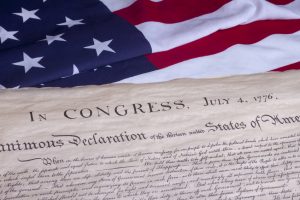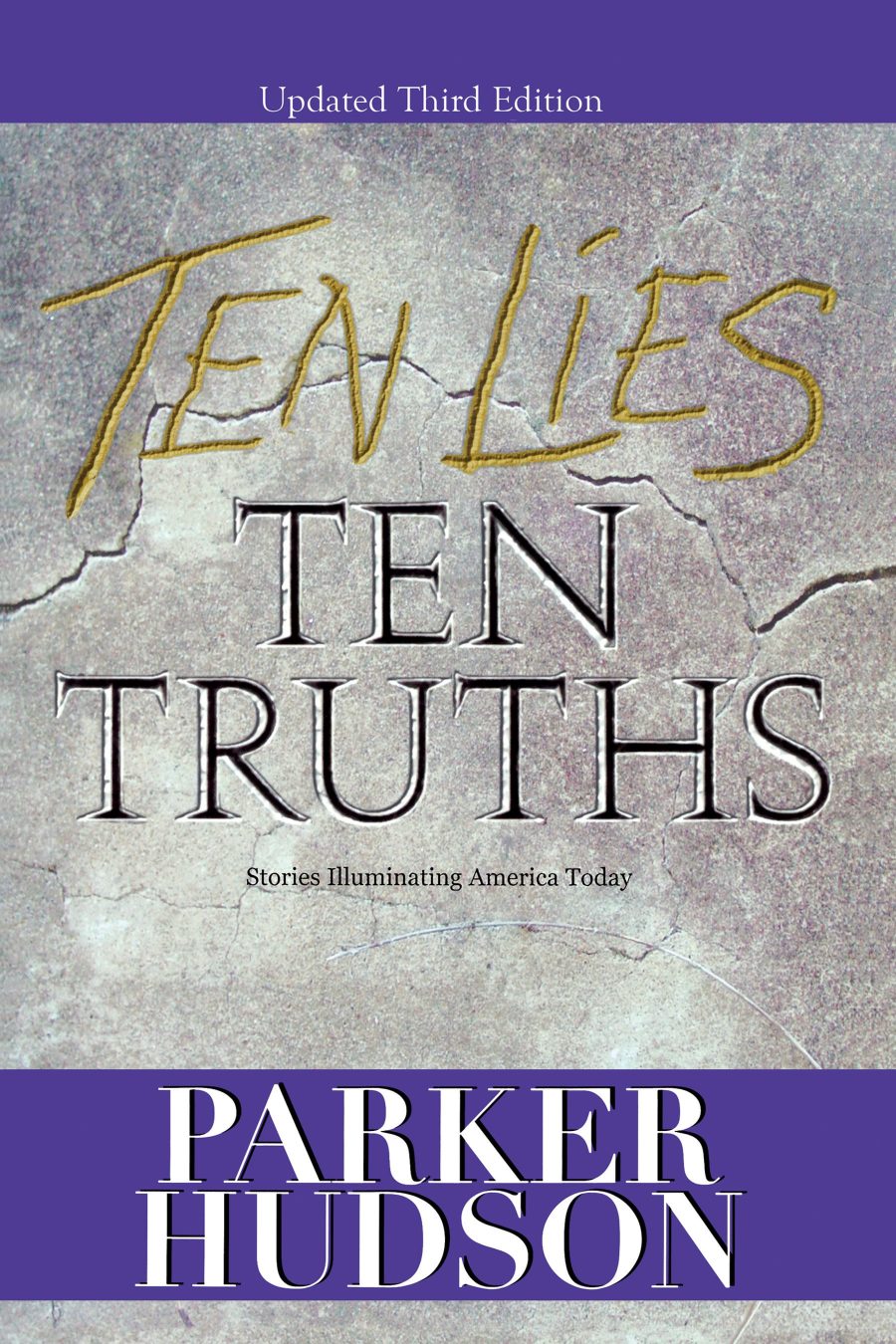Have you ever thought about how the most powerful and long lasting movements and institutions are each underpinned by a religious, secular or philosophical faith foundation, believed by many to be the Truth? In fact,  without that faith foundation, these institutions would not survive.
without that faith foundation, these institutions would not survive.
Virtually every such institution has been organized with power and authority flowing from the top down. The Divine Right of Kings and the Medieval Catholic Church were often at odds, but they were organized identically: The King and the Pope were all powerful, and the Church of that day confirmed to the faithful that both were ordained by God.
The Enlightenment’s original quest to study an orderly world created by God instead turned out to elevate Human Reason and Science over religious faith. A new secular faith in the perfection of Mankind arose, underpinned by the teachings of Rousseau, Locke and Descarte, and later boosted exponentially by the “science” of Darwin. In the seemingly inevitable quest to “improve” ourselves it was natural for those with “the most” Science and Reason to chart the way for the rest of us. This elitist faith structure—again with power flowing from the top down—gave credence to movements and institutions like slavery, eugenics, abortion, communism, fascism, as well as, more benignly, today’s secular progressivism.
flowing from the top down—gave credence to movements and institutions like slavery, eugenics, abortion, communism, fascism, as well as, more benignly, today’s secular progressivism.
It’s actually amazing to think that the ill-named Enlightenment, aided by Social Darwinism, with its emphasis on perfecting humanity by differentiating all people into distinct, hierarchical groups of different inherent values, served as the philosophical foundation for mass movements which created so much human misery.
Why is this observation about how our institutions all have religious or secular faith foundations important to us in America today? Because our nation is the unique result of a secular movement for individual freedom underpinned by a revolutionary religious faith in the value of the individual, and we are losing that underlying faith. Without believing or at least understanding that faith, we are on the verge of losing the foundation of the nation that we know.
 The Reformation in Europe turned the prevailing top-down structure of faith on its head. Luther, Calvin and the others emphasized a personal relationship with the living personhood of Jesus Christ, not one mediated and translated through the Church’s structure. They turned back to the Bible and found that God is focused on one individual at a time, not on groups or institutions.
The Reformation in Europe turned the prevailing top-down structure of faith on its head. Luther, Calvin and the others emphasized a personal relationship with the living personhood of Jesus Christ, not one mediated and translated through the Church’s structure. They turned back to the Bible and found that God is focused on one individual at a time, not on groups or institutions.
Walter A. Henrichsen in his daily devotional, Thoughts From The Diary of a Desperate Man, writes for Day 262 a powerful summary of the faith which motivated, or at least was well studied by, all of the Founders of our nation:
“The Judeo-Christian religion stands in sharp contrast with all other religions in regards to the worth of the  individual. Created in the image of God and redeemed at the price of the Son of God, people are eternal and therefore of infinite worth…No other religion in the world views people from this perspective.
individual. Created in the image of God and redeemed at the price of the Son of God, people are eternal and therefore of infinite worth…No other religion in the world views people from this perspective.
“Jesus did not die for institutions, but for people…The work of the Lord is not building institutions, but redeeming people. People and the Word of God last forever…Never sacrifice the individual for the common good, for who decides what constitutes the common good? Jesus never tried to articulate such a definition; He simply said that He came to seek and save the lost.”
 Our Declaration of Independence’s bold statements about the intrinsic worth of each person can only be understood as underpinned by Reformed Christianity’s emphasis on the individual:
Our Declaration of Independence’s bold statements about the intrinsic worth of each person can only be understood as underpinned by Reformed Christianity’s emphasis on the individual:
We hold these truths to be self-evident, that all men are created equal, that they are endowed by their Creator with certain unalienable Rights, that among these are Life, Liberty and the pursuit of Happiness.—That to secure these rights, Governments are instituted among Men, deriving their just powers from the consent of the governed.
Yes, at that time some of them had slaves. Women were not given equal rights. But this bold statement was like a lighthouse, pointing the way. Over the next two centuries our nation has been on a constant quest toward that light: over 600,000 Americans died in a war to free the slaves, an outcome never before seen in human history, and equal rights are now guaranteed to every American, except to unborn children.
Here is the problem: When we talk about America being a post-Christian nation, what will then be the faith foundation for what is coming in the future? If every institution and movement has a foundation in either religious or secular faith, can the America we know, clearly founded on the Judeo-Christian belief in the worth of the individual, survive?
Our culture and institutions are moving rapidly away from our founding Christian faith. Most movers of 
My concern is that by undermining that Judeo-Christian faith we are destroying the foundation on which our secular nation is built. And what appears to be replacing it emphasizes groups, tribes, victims, and the need for the government to protect everyone’s feelings and to rectify everyone’s problems, with an elite of course required to make those decisions for us.
Let me be clear that I am not advocating a theocracy, a formal mixture of church and state. That always turns into a disaster for both. What was so unique about the timing of the American Revolution was a society where reformed Christian faith was powerfully woven into the majority’s foundational belief system. They worshiped God somewhat differently and argued over details—which is why they did not want a government-established national denomination—but fundamentally they agreed on the truth of the Christian Creeds, which included belief in the intrinsic worth of the individual because he or she is created in the image of God and is an eternal being.
Unlike the mandate of our Founders, our nation appears to be headed toward the supremacy of the group over the individual, with the government using force to decide outcomes. That is a slippery slope advocated by neither our Judeo-Christian faith nor our founding principles.

This is important. In pushing back against China, for example, we are not just contesting and competing with another secular state—we are competing with a fundamentally different belief system which elevates the state over the individual and rationalizes theft, deceit and persecution in the name of serving that state. But if we become more like China, will we continue to recognize this difference before, as happened to the Chinese people, our individual freedoms are gone?
What are we to do? How do we re-weave reformed Christian beliefs back into all facets of our society? Back
13. Promote and encourage movies, TV series, books, podcasts and speakers which uplift our faith, particularly those which connect our faith to historic or current events, like Unplanned and The Overcomer.
14. Speak up on issues where we can clearly demonstrate how our response flows from our faith, like the burden of debt, sex outside of marriage, the importance of the family, personal freedoms, and abortion, to name just a few; and speak out against those who, even our President, demean or marginalize individuals. And have the courage to do both, even when it’s not popular or supported by those around us.
If we lose the culture, we’ll lose the battle. It won’t matter how much money or how many resources we pour into political campaigns or good causes if the next generations do not understand our Christian faith and how important its principles are to both the individual and to the nation. Like some of our Founders, they don’t even have to be believers themselves. Just understand and defend how this faith is the foundation for our American ideals and principles.


Comments